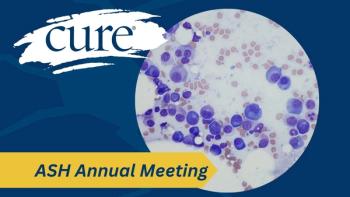
Hormone therapy after breast cancer did not increase risk in BRCA1/2 carriers; estrogen alone was linked to lower risk.

Hormone therapy after breast cancer did not increase risk in BRCA1/2 carriers; estrogen alone was linked to lower risk.

For AYA breast cancer survivors, mobile health intervention was associated with improvements to general and cancer-specific quality of life.

Real and sham acupuncture improved perceived cognitive function versus usual care, with real acupuncture showing greater benefits for objective cognitive outcomes.

Emmy-winning journalist and author Suleika Jaouad recently delivered the keynote address at the inaugural Blood Cancer Heroes celebration.

The FDA granted review to a supplemental biologics license application for Opdivo plus chemo for previously untreated stage 3/4 classical Hodgkin lymphoma.

I struggle to understand why people support policies and leaders that make healthcare less affordable and accessible for everyone.

CURE spoke with Dr. Dickran Kazandjian about why MRD matters for patients with multiple myeloma.

The 60-month local regional recurrence-free rate was 93.2% in the MRI arm versus 95.7% in the no MRI arm, researchers reported.

Enhertu and Perjeta led to better quality-of-life and less side effects than standard-of-care among patients with HER2+ advanced or metastatic breast.

Adding radiation before surgery with Keytruda increased immune cells in tumors and led to encouraging responses in people with early-stage breast cancer.

Tecentriq numerically increased the rates of chemotherapy-induced ovarian failure compared with chemotherapy alone for patients with triple-negative breast cancer.

Verzenio showed meaningful improvement for some patients with HR-positive, HER2-negative breast cancer after prior CDK4/6 treatment.

Tukysa added to Herceptin and Perjeta improved progression-free survival versus placebo in HER2-positive metastatic breast cancer after initial therapy.

Dan, diagnosed with stage 4 pancreatic cancer, shares his journey to remission and insights on clinical trials and patient advocacy.

Nuvisertib plus momelotinib is safe and generated improvements in symptom burden, spleen volume, and anemia outcomes in relapsed/refractory myelofibrosis.

Giredestrant generated improved outcomes over standard endocrine therapy in patients with ER+/HER2–, medium- and high-risk early breast cancer.

Progression-free survival was not statistically significant with Trodelvy versus chemotherapy as first-line treatment in HR+/HER2– metastatic breast cancer.

Emmy-winning journalist and author, Suleika Jaouad, delivered the keynote address at the inaugural Blood Cancer Heroes event.

KLN-1010 was associated with deep, ongoing minimal residual disease (MRD)–negative responses in multiple myeloma.

After cancer, even your closet tells a story you never imagined living. One quiet afternoon, that story took a hilarious and unexpected turn.

Real-world treatment with Yescarta demonstrated durable responses and manageable safety in patients with relapsed/refractory follicular lymphoma.

Dexamethasone before Yescarta reduced the severity of ICANS but did not change how often ICANS or CRS occurred in patients with LBCL.

Pelabresib plus Jakafi delivered stronger, clinically meaningful benefits versus Jakafi alone for people with untreated myelofibrosis.

Tecvayli plus Darzalex Faspro improved overall and progression-free survival versus standard daratumumab regimens in relapsed/refractory multiple myeloma.

Jaypirca therapy improved progression-free survival versus bendamustine plus Rituxan a phase 3 trial for untreated CLL/SLL.

In a recent interview with CURE, Dr. Kai Tsao discussed treatment advancements for patients with prostate cancer.

Lore Gruenbaum, chief scientific officer of Blood Cancer United, sat down for an interview with CURE to discuss the themes shaping blood cancer care today.

Dr. Josh Brody discussed key clinical trial findings for patients with diffuse large B-cell lymphoma.

Xervyteg improved responses and was safe in steroid- and Jakafi-resistant acute graft-versus-host disease affecting the GI tract in a phase 3 trial.

In a direct comparison, Jaypirca matched Imbruvica in response and suggested a progression-free survival benefit for patients with CLL/SLL.